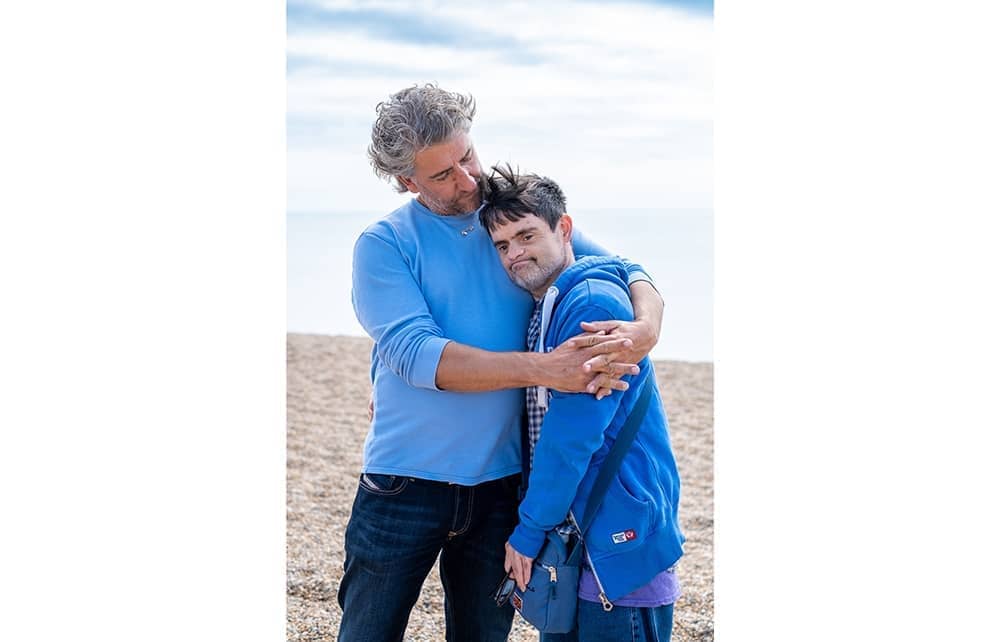This book reveals one man’s determination to enable his brother to live his best life. It is also a fable for our time. It hints at how we all might live if we turned the lens on the world. ‘Does Reuben have a learning disability’ asks Manni Coe, ‘or do we have an understanding disability?’
Coe’s younger brother Reuben, now 39, has Down’s syndrome. In brother.do.you.love.me Coe senior describes their loving upbringing in Yorkshire and Berkshire as other people stared, and Reuben’s adventures living a supported, partially independent adult life. Reuben visited another brother in the US (being able at that stage to fly unaccompanied) and enjoyed part-time voluntary jobs, though he was fired from stacking shelves at Waitrose after wolfing down coleslaw straight from the display cabinet. He also spent more than three years in Spain with Coe, who moved there two decades ago and now guides tourists as well as running a farm with his partner. The arrangement came to an end when Reuben experienced a breakdown in Spain, and willingly moved to an assisted living facility in the south of England. Then the pandemic crashed over the Coes’ world.
Reuben, whose charming illustrations enliven the book (hence its dual authorship), shrank from within, a prisoner in an institution which only serviced him. He became an elective mute and stopped eating. Glimpses on a screen revealed eyes that were ‘dark pebbles’ above the mandatory mask. On a rare permitted visit, his mother cut his filthy fingernails through a crack in a sash window. When lockdown relaxed, Coe returned to the UK and visited Reuben 46 times in as many days. After a text message pinged in asking brother.do.you.love.me, Coe sprang Reuben from the home. The book unravels their painful journey together as Reuben thawed and started to speak again.
Reuben shrank from within, a prisoner in an institution which only serviced him, and stopped eating
I have skin in this game. My only sibling, approaching 60, has an unlabelled neurological condition. He has a fraction of Reuben’s cognitive abilities, and behavioural issues which include violent episodes. Nobody wants to know him really except me and our parents. He has had no visitors except us for four decades. Like Reuben, he enjoys performing (a fabulous Friday night musical bursts out of these pages). When I took my brother to a deserted church in Gloucestershire and he declaimed joyfully from the pulpit, the vicar emerged from the shadows to fulminate: ‘This is a house of prayer.’
So I am familiar with the battles described here – the few victories and multitudinous defeats, ‘the guilt of being apart’, the small Darth Vader suitcase, the obsessive rituals, the ‘best interest committees’ fostered by the 2005 Mental Capacity Act, the institutionalisation (‘He’s still locked away inside, not necessarily because he wants to be,’ Coe writes. ‘It’s what he’s used to’), the fretting but impotent parents, the agency staff, the false starts and the never-ending tears for everyone. ‘Who is Reuben?’ Coe asks. ‘What are his dreams? What does he believe? How can I help him overcome his fear and reclaim himself?’
Two generations ago the chemical cosh provided a handy solution to many of the problems set out in this book. The role of pharmaceuticals still looms large in the care of the intellectually disabled, and Coe discusses the issue both in theory and practice. Other people’s attitudes remain entrenched, even when the pills are sorted out. Coe writes of his brother:
Much of how he perceives himself is shaped by how others treat him. If somebody has Down’s syndrome, we label them as somebody who is different from the rest of society, somebody ‘other’ or ‘special’.
He reveals a failed model. How difficult can it be to empathise? ‘With him, walking at his pace,’ Coe writes simply when he and Reuben do the Camino de Santiago together, ‘my view is altered.’
The book offers insights into the fearful complexities families face when they navigate an underfunded care system. One thinks of those many who do not have family support. I remember white faces like moons awaiting a bleak Christmas when I picked up my brother from boarding special school for the holidays. ‘I find the whole thing degrading to the core,’ says Coe. ‘I have tried to explain so many times the tension between [an institution’s] concept of care and the life I know my brother is capable of living.’
Early on he writes: ‘We fail to put ourselves in Reuben’s shoes because we lack the imagination.’ After Herculean struggles (Sisyphus is a better analogy, as Coe acknowledges), the book closes as Reuben settles into his own flat in a supported community in Stourcastle. It’s his book, really. ‘I’m Down’s outside,’ he tells us, ‘but not inside.’






Comments